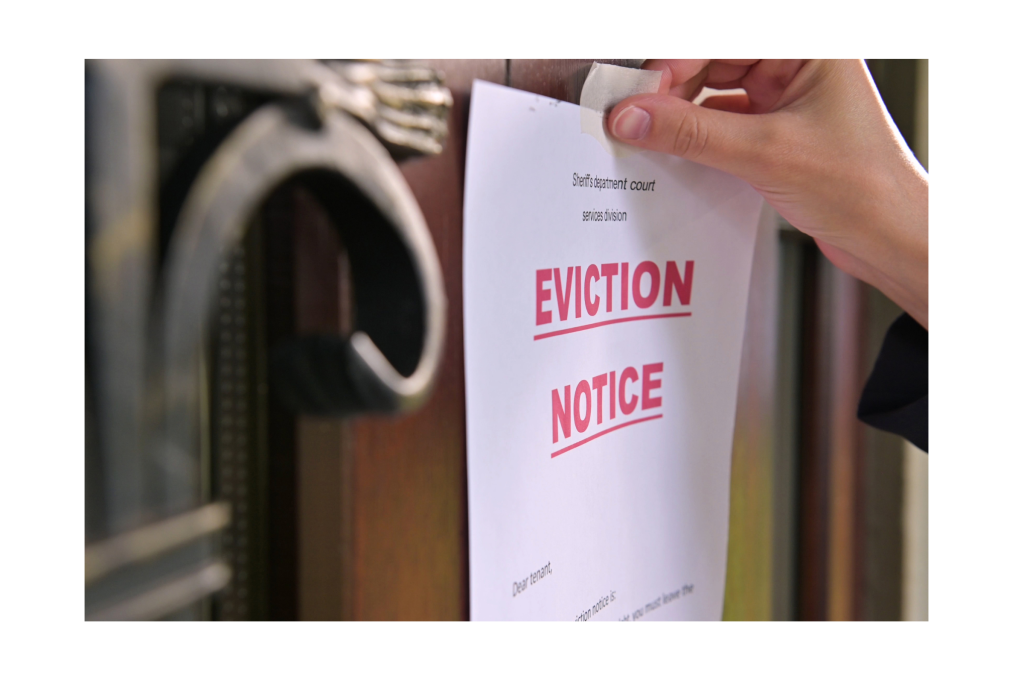Key Takeaways
-
Massachusetts eviction process requires a court order – self-eviction tactics like changing locks or shutting utilities are illegal and can result in lawsuits
- The process typically takes 2-4 months from initial notice to tenant removal, depending on case complexity
- 14-Day Notice to Quit required for unpaid rent with specific language per Chapter 186, Section 11
- 30-Day Notice needed for month-to-month tenants or no-fault evictions
- Mandatory mediation occurs before trial in all Massachusetts eviction cases
- Professional movers must handle belongings during eviction at the landlord’s expense
- Court selection matters – choose between Housing Court or District Court based on your area
The eviction process in Massachusetts requires following specific legal procedures that typically take 2-4 months from start to finish. Massachusetts law strictly prohibits self-help evictions, meaning landlords cannot change locks, shut off utilities, or remove tenants without obtaining a court order first.
Understanding this process is crucial whether you’re dealing with unpaid rent, lease violations, or need to end a tenancy. The state mandates specific notice periods, requires mediation before trial, and has detailed court procedures designed to protect both landlord and tenant rights.
This guide walks you through each step of the Massachusetts eviction process, from determining valid grounds for eviction to the final removal procedures. You’ll learn about different notice requirements, court filing procedures, what to expect during mandatory mediation, and how to handle the enforcement process.
Keep in mind that while this guide covers the general process, complex situations may require consultation with an attorney who specializes in Massachusetts landlord-tenant law.
What Types of Tenants Can You Evict in Massachusetts?
Your eviction approach in Massachusetts depends entirely on what type of tenancy you’re dealing with. The notice requirements and legal procedures vary significantly based on whether your tenant has a written lease or not.
Understanding these distinctions is crucial because using the wrong process can delay your eviction by months and potentially result in having to start over from scratch.
Tenants at Will (No Written Lease)
Tenants at will either never had a written lease or their lease has expired and they’re staying month-to-month. You can evict tenants at will for any reason, but you must still follow proper legal procedures.
For tenants at will, you need to provide a Notice to Quit giving them 30 days or one full rental period (whichever is longer) to vacate, according to Massachusetts General Laws Chapter 186, Section 12. However, different rules apply if the tenant has failed to pay rent.
This flexibility makes month-to-month arrangements easier to terminate, but you still cannot simply tell someone to leave immediately or change the locks.
Tenants with Fixed-Term Leases
A tenant with a fixed-term lease (like a one-year lease) has more protection during the lease period. Their tenancy automatically ends when the lease expires, and they become “tenants at sufferance” if they don’t leave voluntarily.
If you need to evict before the lease ends due to a violation, you must refer to your lease agreement for specific notice requirements. Most lease agreements specify 7- or 14-day notice periods for violations like property damage, unauthorized occupants, or other lease breaches.
The key difference is that you generally cannot evict a tenant with a fixed-term lease without cause until their lease expires, unless they violate the lease terms.
What Are Valid Grounds for Eviction in Massachusetts?
Understanding the legal grounds for eviction in Massachusetts is crucial for property managers and landlords. Using the wrong grounds or failing to follow proper procedures can result in case dismissal and having to restart the entire process.
Massachusetts law allows evictions for specific reasons, each with different notice requirements and legal procedures. Here are the most common grounds and what you need to know about each.
Non-Payment of Rent
Non-payment of rent accounts for approximately 80% of eviction cases filed in Massachusetts, making it the most common reason landlords seek to remove tenants. You have the right to begin eviction proceedings when a tenant fails to pay rent by the due date.
Notice Required: 14-Day Notice to Quit for non-payment, which must include specific language required by Massachusetts General Laws Chapter 186, Section 11. This notice supersedes any federal CARES Act requirements for most properties.
Courts may be more understanding if the missed payment is a one-time occurrence rather than a pattern of late payments. However, you’re legally entitled to proceed with eviction even for a single missed payment if proper notice is given.
Illegal Activities on the Property
Tenants engaging in illegal activities present safety and liability risks that Massachusetts law addresses with expedited eviction procedures.
Notice Required: 7-Day Notice to Quit for most illegal activities, though the specific requirements can be complex. Consult with an attorney before using this ground, as the criteria for what constitutes illegal activity sufficient for eviction can be complicated.
Examples of illegal activities:
- Drug manufacturing, distribution, or related criminal activity
- Violent crimes or threats against other tenants or neighbors
- Weapons violations
- Other criminal behavior that affects property safety
No-Fault Evictions
Massachusetts allows landlords to evict tenants without citing specific cause in certain situations, primarily for tenants at will or at the end of lease terms.
Notice Required: 30-Day Notice to Quit for tenants at will, or 30 days notice before lease expiration for fixed-term tenancies you don’t wish to renew.
Important limitations:
- Cannot be used for discriminatory reasons
- Cannot be used in retaliation for tenant complaints or exercising legal rights
- Must still follow proper notice procedures and timeline requirements
- Some municipalities may have additional restrictions on no-fault evictions
Key point: Even no-fault evictions require following proper legal procedures. You cannot simply decide you want someone out and change the locks.
What Lease Violations Allow Eviction in Massachusetts?
Lease violations beyond non-payment of rent represent a significant portion of eviction cases that property managers handle. Understanding which violations justify eviction and the proper procedures to follow protects your property investment and ensures legal compliance.
Massachusetts lease agreements establish the rules for how tenants should occupy and care for your property. When tenants breach these terms, you may have grounds for eviction, but the notice requirements and procedures vary depending on the severity and type of violation.
Common Lease Violations That Lead to Eviction
The most frequent lease violations we see involve unauthorized occupants or subletting arrangements made without landlord approval. This includes tenants allowing additional people to move in or subletting the property without permission, which violates occupancy limits and can affect your insurance coverage.
Pet policy violations also create grounds for eviction, whether tenants keep pets in no-pet properties or exceed the number or type of pets allowed in the lease. Property damage beyond normal wear and tear is another common issue, including holes in walls, broken fixtures, or modifications made without permission. Learn more about essential landlord documents to properly document violations and protect your investment.
Noise disturbances and nuisance behavior that generate repeated neighbor complaints can justify eviction, particularly when these activities interfere with other tenants’ quiet enjoyment. Some tenants also violate residential lease terms by using the property for commercial purposes, such as operating businesses or storing commercial goods without proper permits.
Notice Requirements for Lease Violations
Most lease violations require a 30-Day Notice to Quit, giving tenants time to either correct the violation or vacate the property. However, many lease agreements specify shorter notice periods, commonly 7 or 14 days for certain violations, and these lease-specific periods take precedence over the general 30-day rule.
The key distinction is between curable and non-curable violations. Some issues like unauthorized pets can be “cured” by removing the pet, while others like property damage that’s already occurred cannot be undone. Always refer to your specific lease agreement for notice requirements and document all violations thoroughly before serving notice.
How to Evict Tenants Without a Lease in Massachusetts?
Evicting tenants without written leases is a common situation property managers face, whether you’re dealing with inherited tenants from property purchases, expired leases, or informal month-to-month arrangements. While these tenants have fewer protections than those with fixed-term leases, you must still follow proper legal procedures.
Massachusetts recognizes these tenants as “tenants at will,” and the eviction process differs from traditional lease-based evictions in several important ways.
Understanding Tenants Without Leases
Tenants without written leases typically include inherited tenants from property purchases, those whose leases expired but continued paying rent, verbal rental agreements, or month-to-month arrangements without formal documentation. While these situations might seem informal, Massachusetts law still recognizes these as legitimate landlord-tenant relationships with legal protections.
The key advantage for landlords is greater flexibility in ending the tenancy, but this doesn’t mean you can bypass legal procedures. These tenants still have rights under Massachusetts law, and you cannot simply tell them to leave without proper notice and court procedures if they refuse to vacate.
Notice Requirements for No-Lease Evictions
For no-cause terminations, Massachusetts law requires 30 days written notice or one full rental period, whichever is longer, according to Massachusetts General Laws Chapter 186, Section 12. This notice doesn’t require you to state a reason for ending the tenancy, but you must follow proper service procedures and allow the full notice period before filing in court.
When evicting for cause, you’ll follow the same procedures as lease-holding tenants. Non-payment of rent still requires a 14-day notice, while other violations typically need 30 days notice. The main difference is that you cannot rely on shorter notice periods that might be specified in written lease agreements, since no lease exists to reference.
Common Challenges with No-Lease Evictions
Proving the landlord-tenant relationship exists becomes crucial when no written lease documents the arrangement. You’ll need alternative documentation such as rent payment records, bank deposits, receipts, or any written correspondence that acknowledges the tenancy relationship. Courts need evidence that a landlord-tenant relationship existed, not just someone living on your property.
Establishing rent amounts and rental periods can also be complicated without lease documentation. Bank records showing consistent monthly payments, any written communication about rent amounts, and payment patterns help demonstrate the terms of your arrangement. Most month-to-month tenancies run from the first of each month, but if rent is paid on different dates, that payment schedule determines the rental period for notice calculations.
What You Cannot Do
Massachusetts law prohibits self-help evictions regardless of whether tenants have written leases or not. The absence of a lease doesn’t eliminate tenant protections or give you the right to change locks, shut off utilities, remove belongings, or physically force anyone out of the property.
These tenants retain the same rights to proper notice, court procedures, and due process as lease-holding tenants under Massachusetts law. Attempting to circumvent legal procedures because “there’s no lease” can result in significant legal penalties and potential lawsuits for wrongful eviction. For guidance on maintaining proper landlord-tenant relationships that prevent legal issues, review our comprehensive guide.
How Does the Massachusetts Eviction Process Work?
The eviction process in Massachusetts follows a structured legal framework that typically takes 2-4 months from initial notice to tenant removal. Understanding each step and its timeline helps property managers plan accordingly and avoid costly mistakes that can delay the process.
Massachusetts requires mandatory mediation and specific court procedures that protect tenant rights while providing landlords a clear path to regain possession of their property. Here’s what you can expect at each stage of the process.
Timeline Overview: What to Expect
- Notice Period: 7-30 days (depending on grounds for eviction)
- Court Filing to Mediation: 2-3 weeks after filing complaint
- Mediation to Trial: 1-2 weeks if mediation fails
- Trial to Judgment: Same day or within a few days
- Judgment to Physical Removal: 10-14 days for execution process
- Total Timeline: 2-4 months from start to finish
Keep in mind that contested cases, tenant appeals, or procedural errors can extend this timeline significantly. Proper documentation and following procedures correctly the first time is crucial for staying on schedule.
1. Serve the Required Notice to Quit
The eviction process always begins with serving a formal written notice that complies with Massachusetts legal requirements. The type of notice and language requirements vary depending on your grounds for eviction.
| Type of Notice to Quit | Explanation |
|---|---|
| 14-Day Notice to Quit | This notice is for late or unpaid rent payments. It must follow specific guidelines and include required language and an attestation form per Massachusetts General Laws Chapter 186, Section 11. This notice supersedes the 30-day notice requirement of the federal CARES Act. |
| 30-Day Notice to Vacate | Use this notice for tenants on a month-to-month agreement or those who’ve overstayed a fixed-term lease. You can download a Massachusetts-compliant template here to ensure proper formatting. |
| 7-Day Notice to Quit | This notice is for tenants engaged in illegal activity. It’s recommended you consult with an attorney before issuing this notice because the criteria can be complicated. Here’s a template for illegal activity notices if your situation qualifies. |
You must wait for the full notice period to expire before filing in court. For example, a 14-day notice for unpaid rent means you cannot file until day 15, and the tenant must have the full 14 days to respond or remedy the situation.
2. File Your Complaint in the Appropriate Court
Once the notice period expires and the tenant hasn’t resolved the issue or vacated, you can file a Summary Process complaint. You’ll file in either Housing Court or District Court depending on your location and local court operations.
The filing fee varies by court but typically ranges from $180-$300. You’ll need your lease agreement, proof of notice service, rent ledger, and any supporting documentation for lease violations.
3. Serve the Tenant with Court Papers
Massachusetts courts issue a “Summary Process Summons and Complaint” that must be served by a constable or sheriff. This official service proves the tenant received proper legal notice of the court proceedings.
The summons automatically schedules the entry date and first court proceeding. Tenants typically have 7-10 days to file an answer after being served, though this can vary by court.
4. Attend Mandatory Mediation
All eviction cases in Massachusetts require mediation before trial. A Housing Specialist facilitates discussions between you and the tenant to potentially resolve the situation without going to trial.
Even if you don’t reach an agreement, mediation provides valuable information about the tenant’s defenses and can help expedite future court proceedings. Landlords who fail to attend mediation risk having their case dismissed.
5. Prepare for Trial (If Needed)
If mediation doesn’t resolve the case, you’ll proceed to trial. Come prepared with detailed documentation including rent records, lease agreements, photographs of violations, correspondence with tenants, and witness testimony if applicable.
Understanding the Uniform Summary Process Rules is essential for presenting your case effectively. The judge will hear both sides and typically issue a ruling the same day.
6. Execute the Judgment
If you win at trial and the tenant doesn’t voluntarily leave, you must request a “Motion for Execution” from the court. Once granted, a constable serves the tenant with a 48-hour notice to vacate.
The actual eviction must be conducted by licensed, bonded, and insured movers under law enforcement supervision. You’re responsible for paying moving and storage costs for the tenant’s belongings, though you can attempt to recover these costs later.
Navigating Massachusetts Evictions Successfully
The eviction process in Massachusetts requires patience, attention to detail, and strict adherence to legal procedures. While the 2-4 month timeline may seem lengthy, following proper procedures protects both your property investment and legal standing as a landlord.
Remember that mandatory mediation, specific notice requirements, and court procedures exist to ensure fairness for all parties involved. Cutting corners or attempting self-help evictions can result in case dismissals, legal penalties, and costly delays that extend the process even longer.
Each eviction situation presents unique challenges, whether you’re dealing with unpaid rent, lease violations, or tenants without written agreements. Having a solid understanding of Massachusetts eviction laws, proper documentation practices, and realistic timeline expectations positions you to handle these situations professionally and legally.
For complex cases or when tenant defenses seem strong, consulting with an attorney who specializes in Massachusetts landlord-tenant law can save time and prevent costly mistakes. The investment in proper legal guidance often pays for itself through faster resolutions and avoided complications.
For landlords managing properties in multiple states, check our guides for Wisconsin eviction laws and Illinois eviction laws to understand state-specific requirements.
Prevent Evictions Before They Start
The most cost-effective eviction is the one you never have to file. Quality tenant screening helps property managers identify reliable tenants who pay on time and follow lease terms, dramatically reducing eviction risks and protecting your rental income.
RentSafe’s comprehensive screening platform helps you screen tenants effectively by combines credit checks, background verification, and income analysis to help Massachusetts property managers make informed tenant decisions. Our streamlined process takes minutes instead of days, helping you fill vacancies faster with qualified tenants.
Start your free RentSafe account and discover how proper tenant screening reduces evictions, minimizes vacancy periods, and protects your property investments. Join thousands of successful landlords who choose the right tenants from the start.
FAQs about Eviction process in Massachusetts
How Much Does Eviction Cost in Massachusetts?
Eviction costs vary, but generally, you’re looking at a few hundred dollars at least. These fees cover court filing, legal representation, and paying a constable to deliver notices. You may also lose out on rental income during the eviction process. In some cases, you may incur additional expenses related to the removal and storage of the tenant’s belongings. It’s essential to carefully review your lease agreement for any clauses related to these expenses. It’s recommended to budget for these costs in advance.
Can a Tenant Fight an Eviction in Massachusetts?
It may be daunting to landlords, but tenants in Massachusetts do have legal options for fighting evictions. The most common defense is the landlord not upholding their end of the lease agreement. This includes not fulfilling the right to quiet enjoyment or the warranty of habitability. Essentially, if there are problems with the rental, such as no heat or hot water outside of standard maintenance, the tenant could have a case. A judge could deem an eviction attempt as unlawful or delayed until you fix the issues. Tenants facing eviction may also seek assistance from government organizations or legal aid societies that specialize in housing law.
Can a landlord evict you for no reason in Massachusetts?
Yes, Massachusetts allows no-fault evictions for tenants at will (month-to-month or no lease) with proper 30-day notice. However, you cannot evict tenants with fixed-term leases without cause until their lease expires. Even no-fault evictions must follow proper legal procedures and cannot be discriminatory or retaliatory in nature.
How long does it take to evict a tenant in Massachusetts?
The Massachusetts eviction process typically takes 2-4 months from initial notice to tenant removal. This includes 7-30 days for the notice period, 2-3 weeks from court filing to mediation, and additional time for trial and execution if needed. Contested cases or procedural errors can extend this timeline significantly.
What happens if I evict someone illegally in Massachusetts?
Self-help evictions like changing locks, shutting off utilities, or removing tenant belongings without a court order are illegal in Massachusetts. Landlords who attempt illegal evictions can face lawsuits for wrongful eviction, be required to pay tenant damages, and potentially face criminal charges. Always follow proper legal procedures regardless of the situation.
Do I need a lawyer to evict someone in Massachusetts?
While not legally required, hiring an attorney experienced in Massachusetts landlord-tenant law is highly recommended, especially for complex cases or first-time evictions. The mandatory mediation process, specific notice requirements, and court procedures can be complicated. An attorney can help ensure proper procedures and increase your chances of success.








